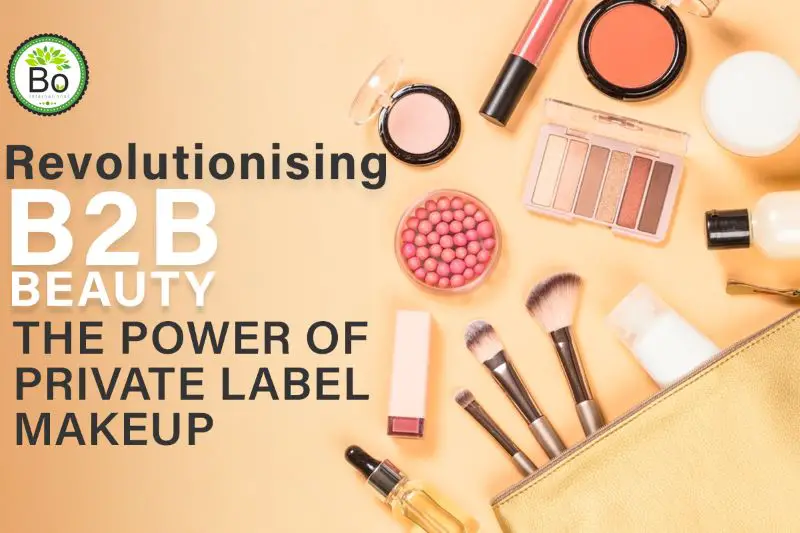Click here to get this post in PDF
In the dynamic world of B2B beauty, the concept of private label makeup has emerged as a transformative force, redefining the way businesses approach the beauty industry. This blog post aims to shed light on the game-changing advantages of private label makeup products in the B2B sector, emphasising its role in wholesale customization and providing actionable steps for businesses to implement this revolutionary approach.
How Private Label Makeup Sets B2B Brands Apart
Private label makeup is more than just a product; it’s a bespoke branding solution that empowers businesses to stand out in the crowded beauty market. Unlike traditional wholesale arrangements, private label makeup allows B2B clients to create a unique identity for their brand by customising products to align with their vision. This level of personalization not only fosters brand loyalty but also sets businesses apart from competitors.
Wholesale Customization’s Role in B2B Beauty Brand Differentiation
One of the key advantages of private label makeup manufacturer is the unparalleled level of customization it offers in the wholesale beauty sector. Businesses can tailor formulations, colours, and packaging to meet the specific needs and preferences of their target audience. This flexibility enables B2B clients to curate a product line that resonates with their brand ethos, ultimately leading to increased customer satisfaction and loyalty.
The Innovative Power of Private Label Makeup in B2B
Private label makeup is a game-changer for B2B beauty businesses seeking to establish a unique identity and enhance their market presence. By investing in private label solutions, companies can break away from generic products and offer a curated selection that reflects their brand personality. This not only attracts discerning customers but also positions the business as an industry leader with a distinct and recognizable product line.
Advantages of Private Label Makeup for B2B Success
Brand Differentiation: Private label makeup allows B2B clients to differentiate their brand from competitors by offering exclusive and customised products that cater to their unique audience.
Enhanced Profit Margins: With private label solutions, businesses can cut out the middleman, reducing costs and increasing profit margins. This financial advantage is a significant draw for B2B clients looking to optimise their bottom line.
Faster Time-to-Market: Private label manufacturers often have shorter production timelines compared to traditional suppliers. This enables B2B clients to bring new products to market more quickly, staying ahead of industry trends.
Build Customer Loyalty: The ability to offer exclusive, personalised products fosters a sense of loyalty among customers. Consumers are more likely to return to a brand that provides unique and tailored solutions.
Control over Quality: Private label partnerships allow businesses to maintain strict control over the quality of their products. This is crucial for building trust with customers and ensuring repeat business.
Navigating the Steps to Introduce Private Label Makeup for Wholesale Clients
Implementing private label makeup in a B2B beauty strategy requires careful planning and execution. Here are key steps for businesses looking to embrace this transformative approach:
1. Market Research and Target Audience Analysis
Before diving into private label makeup, businesses must conduct thorough market research to understand trends, consumer preferences, and gaps in the market. Identifying the target audience is crucial for tailoring products that resonate with their needs and desires.
2. Selecting a Reputable Private Label Manufacturer
Choosing the right private label manufacturer is a critical step in the process. Look for a partner with a proven track record, quality certifications, and the ability to customise formulations, colours, and packaging to meet your brand’s specifications.
3. Designing Unique Branding and Packaging
Crafting a distinctive brand identity is key to the success of private label makeup. Work closely with graphic designers and packaging experts to create a visually appealing and cohesive brand image that sets your products apart on the shelves.
4. Customising Formulations and Product Range
Collaborate with the private label manufacturer to customise formulations that align with your brand identity and cater to the preferences of your target audience. Develop a product range that covers a variety of beauty needs and reflects the uniqueness of your brand.
5. Establishing an Effective Marketing Strategy
Once the private label makeup line is ready, a robust marketing strategy is essential to create awareness and drive sales. Leverage digital marketing channels, social media, influencers, and other avenues to showcase the uniqueness of your products and connect with your target audience.
6. Monitoring and Adaptation
Continuously monitor the performance of your private label makeup products in the market. Gather feedback from customers and adapt your strategy accordingly. This iterative approach ensures that your brand stays relevant and continues to meet the evolving needs of your audience.
Conclusion
In the competitive landscape of B2B beauty, private label makeup emerges as a beacon of innovation and differentiation. By embracing this game-changing approach, businesses can redefine their brand, offer unparalleled customization, and reap the numerous advantages it brings. With the right steps and a commitment to quality, private label makeup has the potential to elevate B2B beauty ventures to new heights, setting them apart as leaders in the ever-evolving beauty industry.
You may also like:
Ultimate Guide to Choosing the Best Fragrance Oil for Candles
3 B2B Market Research Methods That Most Organisations Overlook
Image source: Depositphotos.com

